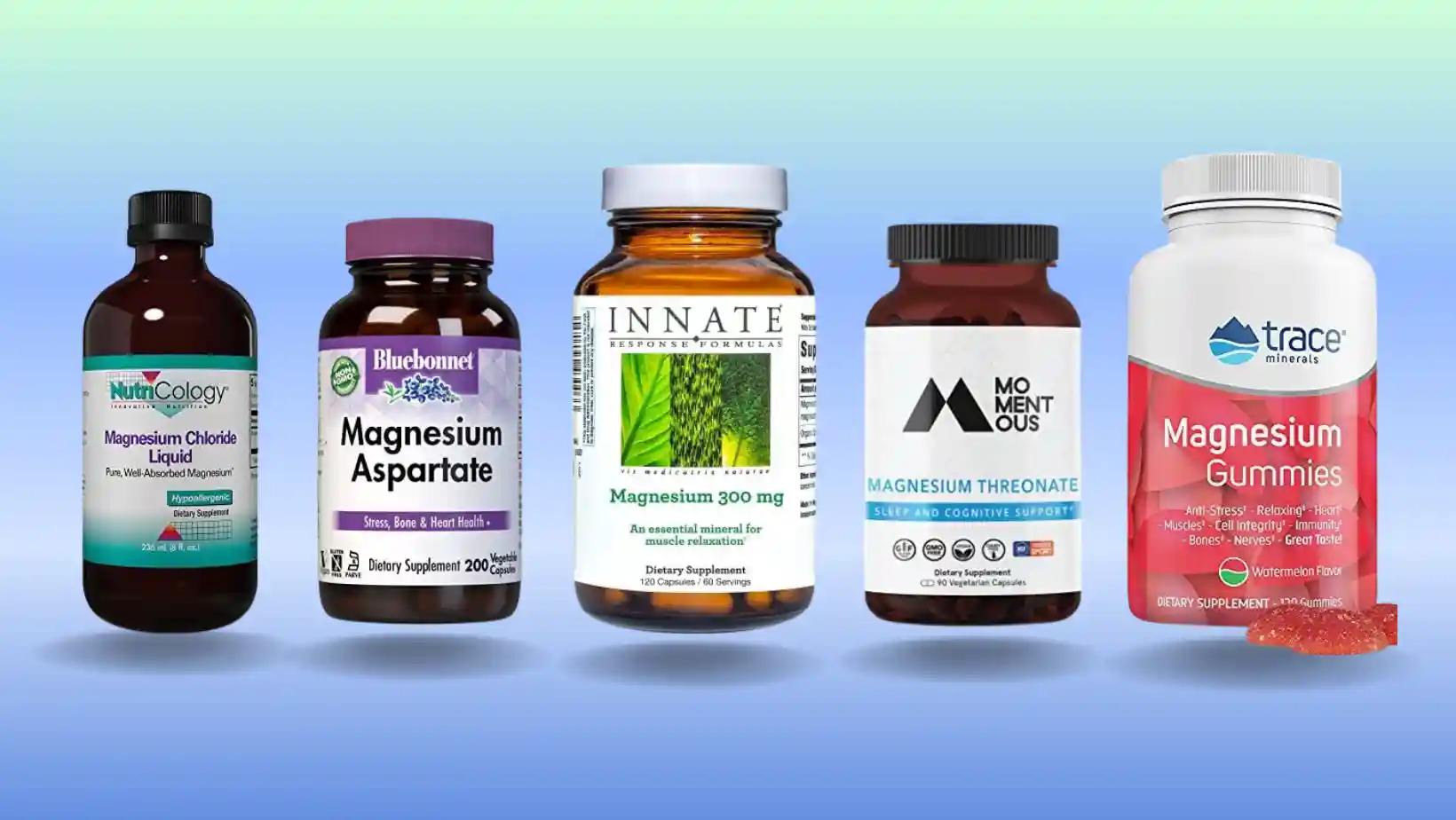Magnesium, sometimes known as “the miracle mineral” due to its several roles in promoting health and wellness, is important and necessary for the body to function normally.
Green leafy vegetables, whole grains, nuts, seeds, and beans have traditionally been the richest suppliers of magnesium. People have eaten these items less frequently over time. Over-processing has also reduced the natural magnesium content of many foods; stress can also contribute to magnesium deficiency. As a result, many people worldwide do not fulfill their daily magnesium requirements and may benefit from supplementation.
Our top picks:
1
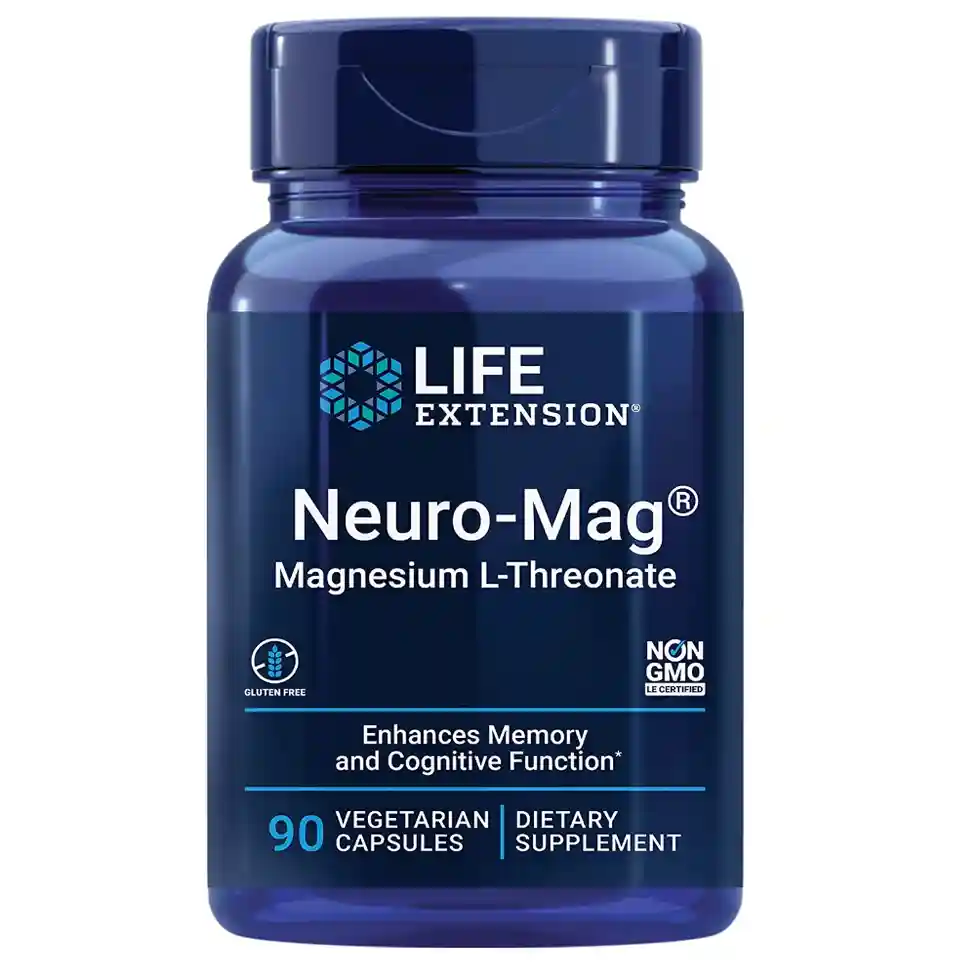
BEST MAGNESIUM SUPPLEMENT FOR BRAIN HEALTH
Life Extension Neuro-Mag Magnesium L-Threonate
9
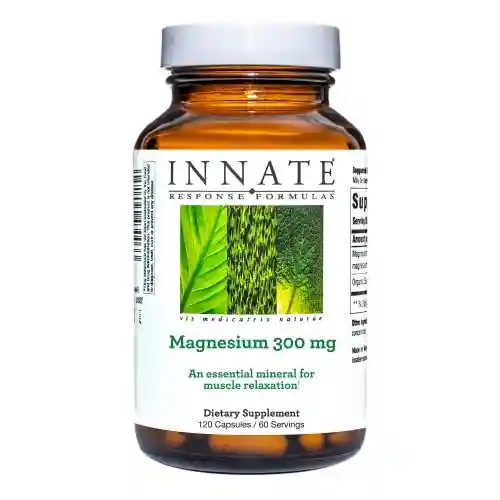
BEST MAGNESIUM SUPPLEMENT CONTAINING REAL FOOD
INNATE Response Formulas Magnesium 300 mg
“Magnesium is a mineral that is involved in more than 300 of the body’s metabolic reactions,” explains registered dietitian and certified nutrition support clinician Eduardo Wrubel, M.S., R.D., C.D.N., CNSC. “Its role in human health spans a vast spectrum, from D.N.A., R.N.A., and insulin formation to energy use and storage, protein building, muscle function, bone health, and nervous and cardiovascular systems.” Because so many of the body’s activities rely on it, magnesium deficiency is linked to chronic disorders such as diabetes, high blood pressure, strokes, migraines, and heart disease.”
Because the FDA does not approve dietary supplements before they are sold, it is critical to conduct research before incorporating them into your program. Our team of registered dietitians at the HomeAccessoris Institute Nutrition Lab reviewed dozens of magnesium supplements, preferring options that trustworthy third parties like USP and NSF have tested. These measures are intended to help ensure that there are no dangerous ingredients in the products and that what is in the bottle matches the label.
At the end of this guide, you may discover more about magnesium and how we evaluate magnesium supplements, including what to look for when selecting the best magnesium supplement. Once you’ve found the ideal magnesium supplement, read our guidance on when to take magnesium. If you’re looking for other supplements to help you live a healthier life, check out our top selections for the best multivitamins for men and women and the best B12, iron, and fish oil pills.
1
BEST MAGNESIUM SUPPLEMENT FOR BRAIN HEALTH
Life Extension Neuro-Mag Magnesium L-Threonate
NOW 30% OFF

PROS
- Third party tested
- Non-GMO
CONS
- 3 capsules for one serving
specifications
Type
Capsule
Dosage
3 capsules
Price per dosage
$1.32
Age group
18+
Form
Magnesium L-Threonate
Percent daily value
34%
The form of magnesium in this supplement, L-threonate, was created at MIT, and a recent study suggests that it may improve memory and cognitive performance by increasing magnesium levels in the brain.
While all age groups showed overall improvement, elderly persons showed the biggest improvement. Other research has found that “high magnesium intake appears to be associated with better cognitive function” in older persons, regardless of the type of magnesium consumed. According to the people we spoke with for this story, this is a good option for reducing anxiety, headaches, and sleeping problems.
NSF International has certified Life Extension as GMP. According to the company, its product contents are confirmed using advanced analytical procedures to verify that each product appropriately represents the label claims.
2
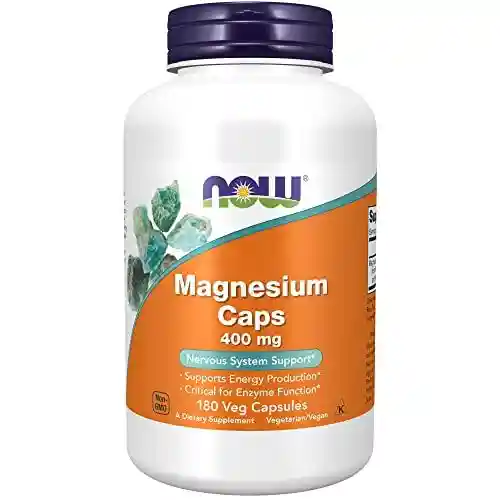
PROS
- Suitable for vegans and vegetarians
- Third party verified
CONS
- May have laxative effect
specifications
Type
Capsules
Dosage
1 capsule
Price per dosage
$0.10
Age group
18+
Form
Magnesium oxide, magnesium citrate and magnesium aspartate
Percent daily value
95%
According to NOW, this magnesium supplement may help with nervous system support by having a soothing impact, which may contribute to improved relaxation and better sleep quality.
It contains various magnesium compounds, including magnesium oxide, commonly used as an antacid or laxative. It also contains magnesium citrate, which may help with digestion and constipation. Instead of taking many doses throughout the day, one capsule will give you a complete dose. This selection has been third-party tested by Underwriter Laboratories (UL), which guarantees labeling correctness, purity, and potency and is non-GMO certified. Amazon customers indicate that this option relieves muscle cramps and improves intestinal health.
According to DJ Blatner, RDN, author and NOW Wellness Expert, magnesium flakes “are great for soaking in the tub to soothe the body and muscles, and even a magnesium topical spray for those who want the muscle soothing effects of magnesium anytime, no bath needed.”
3

PROS
- NSF certified
- GMO-free and vegan
CONS
- More expensive than others
specifications
Type
Capsules
Dosage
3 capsules
Price per dosage
$1.50
Age group
18+
Form
Magtein Magnesium L-Threonate
Percent daily value
34%
Magnesium L-threonate may be the “most effective form of magnesium,” according to former NFL lineman and CEO of Momentous, Jeff Byers.
“This form of magnesium can cross the blood-brain barrier and may help to promote brain health, including improved cognitive function and memory,” Byers says. All Momentous products are NSF and Informed-Sport certified, testing to assure consumption does not violate athletic standards and for labeling accuracy, purity, and potency.
This pick is GMO-free, vegan, and backed by an impressive advisory board of pro athletes, doctors, scientists, and other experts. Users we spoke with for this story report Momentous magnesium helps to provide better sleep, and it’s easy to swallow with no aftertaste.
4
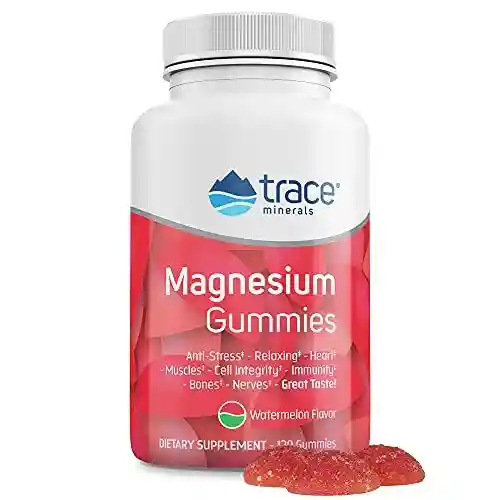
PROS
- Third-party tested
- Organic ingredients
CONS
- Gummy form is not for everyone
specifications
Type
Gummy
Dosage
1 gummy per day ages 4 to 12 years of age, 4 gummies for ages 13+
Price per dosage
$1.00
Age group
4+
Form
Magnesium citrate
Percent daily value
80%
This pick contains magnesium citrate in the shape of watermelon-flavored gummies and is created with organic ingredients, including a trace of cane sugar. As a cGMP-accredited laboratory, Trace Minerals conducts third-party testing on all products for quality, potency, purity, and safety.
A recent study found that supplementing with magnesium citrate improved blood glucose and insulin levels in people with low magnesium. Following magnesium citrate treatment, the individuals’ vitamin D levels improved. Please remember that we recommend talking with your physician or healthcare practitioner before serving youngsters.
According to Amazon reviewers, Trace Mineral candies taste like candy and help with various concerns ranging from sleep and anxiety to improved digestion.
5
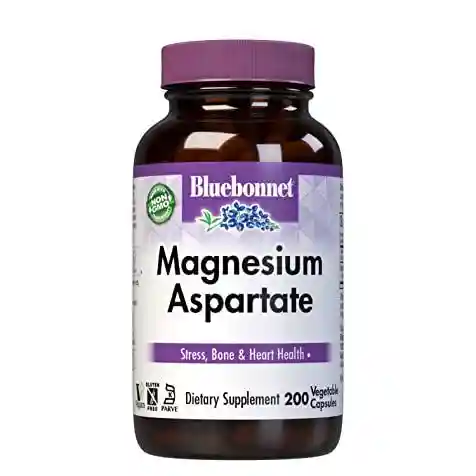
PROS
- Third party verified
- Meets 95% of daily value in one serving
CONS
- Can be difficult to swallow for some
specifications
Type
Capsule
Dosage
2 capsules
Price per dosage
$0.26
Age group
18+
Form
Magnesium aspartate
Percent daily value
95%
Bluebonnet supplements are made in a GMP-compliant facility to ensure authenticity, purity, and potency.
According to the brand, all formulae are rigorously tested to ensure they live up to the claims on the label. Because this supplement is non-GMO and vegan, it is suitable for vegetarians and vegans. Two capsules provide 400 mg of magnesium or 95% of the daily intake, so if you are magnesium deficient and do not consume enough magnesium-rich foods, this may be one to consider.
Many of the consumers we spoke with for this story said they like how the pill has a light laxative impact and helps with muscle cramping.
6

PROS
- Gentle on the stomach
CONS
- Can be difficult to swallow
specifications
Type
Capsules
Dosage
2 capsules
Price per dosage
$0.56
Age group
18+
Form
Magnesium Bisglycinate
Percent daily value
48%
According to the National Institutes of Health (NIH), magnesium may aid in promoting muscle and neuron function, blood sugar levels, and bone health. Although there are many other forms of magnesium, “magnesium glycinate is a top choice for anxiety, sleep, and stress,” according to Ashley Koff, R.D. of The Better Nutrition Program.
Magnesium in high concentrations might have a laxative effect. We like this option because it is completely chelated. Chelated minerals may be more absorbable and produce less stomach discomfort than other types of magnesium. According to the manufacturer, this supplement has superior GI tolerance than other magnesium supplement formulations. According to Amazon reviews, the tablets are big and difficult to swallow. Others said that using magnesium helped them sleep through the night.
7

PROS
- Third-party tested
- Can mix into liquids
CONS
- Taste can be a deterrent
specifications
Type
Liquid
Dosage
1/2 teaspoon, 2-3 times daily
Price per dosage
$0.62
Age group
18+
Form
Magnesium chloride
Percent daily value
66.5%
Nutricology is distinguished by the fact that it is available in liquid form. The company has stringent in-house quality control requirements, and they analyze their raw ingredients and completed goods in recognized independent analytical labs.
It is simple to include in beverages but should be blended with at least eight ounces of liquids. According to the firm, this supplement may be more quickly absorbed than other types of magnesium without causing gastrointestinal irritation.
According to Amazon reviewers, the taste can be “metallic” and “salty,” making it difficult for some to swallow; mixing this with juice, water, or almond milk may be beneficial to make it more pleasant. Besides aiding sleep, this selection has been reported to reduce joint discomfort by Amazon reviewers.
8

PROS
- Third party verified
- No artificial flavors or synthetic dyes
CONS
- May have laxative effect
specifications
Type
Softgels
Dosage
2 softgels
Price per dosage
$0.39
Age group
18+
Form
Magnesium citrate
Percent daily value
60%
According to studies, magnesium citrate is more easily absorbed than other forms of magnesium.
“Magnesium citrate may be more useful for bowel motility,” according to Koff, than other kinds of magnesium. This selection has been USP third-party validated, which means it has been tested for pollutants, including heavy metals and pesticides, and approved for labeling correctness, potency, and purity. According to Amazon reviews, this option can aid constipation and leg cramps.
This supplement is available in a gluten-free, novel gummy and free of artificial flavors, synthetic colors, high fructose corn syrup, and artificial sweeteners.
9
BEST MAGNESIUM SUPPLEMENT CONTAINING REAL FOOD
INNATE Response Formulas Magnesium 300 mg
NOW 58% OFF

PROS
- Glyphosate-free verified
- Non-GMO project verified
CONS
- Capsules can be difficult to swallow
specifications
Type
Capsule
Dosage
2 capsules
Price per dosage
$0.63
Age group
18+
Form
Magnesium malate, magnesium citrate, magnesium glycinate
Percent daily value
71%
Spinach is one of the highest magnesium-containing foods, with a half cup yielding around 75 mg. This supplement contains 50 mg of organic spinach and three different kinds of magnesium: citrate, malate, and glycinate.
Our nutritionists like the company’s goal of making “nutritional supplements as food-like as possible.” Furthermore, all INNATE Response supplements are glyphosate-free, non-GMO Project Verified, and tested for 125+ chemicals and herbicides. The company is a Certified B Corporation, which satisfies the highest transparency, accountability, and performance standards.
In addition to relieving constipation and enhancing sleep, individuals interviewed for this piece reported that this pill helped with headaches.
10

PROS
- NSF-certified
- Free from added sugars
CONS
- Contains monkfruit and may taste too sweet for some
specifications
Type
Powder
Dosage
1 scoop (3.95 grams) daily
Price per dose
$0.70
Age group
18+
Form
Bisglycinate chelate
Percent daily value
48% DV
Thorne offers a powdered version of magnesium that is NSF Certified for Sport; it contains no chemicals prohibited by major sporting organizations and is safe for competitive athletes to take. It has no added sugars and only a few ingredients, with a hint of monk fruit for extra drinkability. Although monk fruit is a non-calorie sweetener with no insulin effect, it can provide a sweet flavor. If you want less sweetness, our nutritionists recommend diluting with water.
According to a user, this product does not produce the digestive difficulties associated with many other kinds of magnesium.
How we chose the best magnesium supplements
While there are numerous magnesium options available in a variety of forms, we analyzed our options using the following criteria:
✔️ Third-party testing: We highlighted companies who undertake third-party testing by reliable institutions such as USP and NSF to verify quality standards and that what is on the product label is what customers are getting. We looked at marketing claims, ingredient lists, and product quality, and we emphasized companies that test for heavy metals, pesticide and herbicide contamination, and other issues.
✔️ Magnesium forms: We looked for magnesium forms that may meet various dietary needs, preferences, and budgets.
✔️ products: We favored businesses that utilize higher-quality products free of artificial preservatives, flavors, sweeteners, synthetic coloring agents, and fillers.
What to look for when shopping for magnesium supplements
Magnesium supplementation may be harmful to people who have kidney problems. PPIs (proton pump inhibitors) and other drugs can also interact with magnesium supplements. Please consult your healthcare physician before adding any supplement to your dietary plan.
✔️ Amount: Choose a magnesium supplement that does not exceed 100% of the daily value (DV), as you are most likely getting magnesium through meals during the day. If you take a calcium supplement, talk to your doctor about the type and amount to take with magnesium to ensure you have the proper ratio. “Magnesium and calcium work in opposition to each other; it’s fine and intended to get both of them from foods, but there can be a benefit to isolating them from each other from a supplement standpoint depending on the health goals,” Koff adds.
✔️ Magnesium supplements include tablets, capsules, soft gels, candies, effervescent powders, oils, and salts. Plenty of other options if you don’t enjoy swallowing huge medications. Consider the serving amount, as some magnesium supplements necessitate numerous daily doses. “If you are taking magnesium to help with blood sugar, optimize inflammation, or address digestive health, excess added sugar isn’t a win; look for supplements that don’t contain added sugars,” Koff adds. “Collaborate with your practitioner to determine the best form for your specific needs.”
✔️ Certifications: Despite the U.S. Food and Drug Administration (FDA) presence, the supplement sector in the United States is poorly regulated overall. As a result, we recommend selecting brands that have been validated by a third party to ensure that the information on the label is correct. Choose brands confirmed by USP or NSF and bear their respective seals or those awarded by an independent, third-party organization that claims quality control through purity tests and ingredient fact-checking. Supplements bearing the USP and NSF seals have validated their ingredient list and have passed tests for manufacturing pollutants such as lead or other heavy metals. Customers can also consult the FDA’s Good Manufacturing Practices.
What is magnesium?
Magnesium is a necessary mineral as well as an electrolyte. It occurs naturally in the body and is required for various tasks.
“Magnesium works as a cofactor in metabolic reactions; it partly makes up structures in your body like bone, and its presence balances electrical charges so that the conditions are right for your body to function properly,” adds Wrubel. “In other words, magnesium is a transporter, a building block, and an assistant in hundreds of metabolic reactions involved in building and maintaining a healthy body.”
Dietary magnesium is an excellent approach to recommended daily needs magnesium requirements of 310-320 mg for women and 400-420 mg for men. Green vegetables, particularly spinach, fruits, whole grains, legumes, nuts, seeds, fish, meat, and water, both tap and mineral waters, are all good sources of magnesium.
Before incorporating supplements into your routine, like with all supplements, consult with your healthcare professional.
What are the benefits of magnesium?
Because magnesium contributes to many bodily functions, it has numerous health benefits. “It helps reduce anxiety, support deep sleep, reduce tension (including aches like headaches, cramps, etc.), helps the heart to pump blood and thus move nutrients, and helps the digestion tract to move better,” Koff explains. “It also helps to build and maintain healthy bone mass.”
The RDI for magnesium for adults is 310 to 420 mg per day. “Low magnesium levels are associated with several chronic diseases,” Wrubel explains, “but that doesn’t necessarily mean that magnesium supplementation will improve symptoms or prevent any of those diseases.”
Some of the more researched health conditions that may benefit from magnesium supplementation are as follows:
✔️ Bone health: Between 55 and 60% of magnesium is stored in bones. “A consistent amount of magnesium seems to be the most beneficial for bone health,” adds Wrubel. “Deficiency in this mineral can contribute to osteoporosis by altering parathyroid hormone activity and encouraging low-grade inflammation.” A review of multiple studies indicated that supplementing with magnesium improved bone mineral density and reduced fracture risk.”
✔️ Type 2 diabetes: Studies demonstrate that adequate and insufficient magnesium improves insulin sensitivity. “In one study, 300mg of magnesium intake per day versus a placebo was associated with significant improvements in insulin sensitivity for non-diabetic subjects,” Wrubel explains. “Magnesium acts as a cofactor for enzymes involved in insulin secretion and receptors, which helps prevent and treat insulin resistance and Type 2 diabetes,” Koff says.
“While research has indicated that magnesium supplementation may have a mild benefit on blood sugar control, more studies are needed to determine the exact supplementation doses,” says certified diabetes educator and registered dietitian Grace Hanlon, MS, RD, CDN, CDE. “The best advice would be to eat a diet rich in magnesium-containing foods beneficial for long-term health, weight management, and blood sugar control.” These foods include Avocados, almonds, seeds, leafy greens, and tofu.
✔️ Migraines: Magnesium supplementation may be beneficial in the treatment of migraines. “There is evidence that studies support very low-level supplementation (500mg vs. the RDI 310 to 420) for migraines may be beneficial, although more research is needed,” Wrubel explains.
Why trust Home Accessories?
HA has more than 15 years of experience researching, producing, and editing content on skincare. It draws on the knowledge of top industry experts like dermatologists and aestheticians as well as the scientists at the Home Accessories Institute Beauty Lab. She is an authority in moisturizers and all other types of facial skincare products. April collaborates closely with the HA Beauty Lab to organize the testing of skincare products and transform test results into top-notch, enticing content for Home Accessories that is factually correct and validated by science.
Former senior editor at the Home Accessories Institute, Nicole Saporita frequently worked with specialists from the Beauty Lab.

